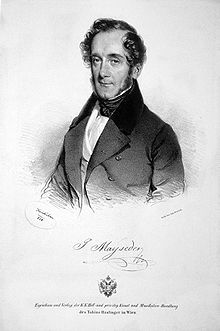Joseph Mayseder

Joseph Mayseder (27 October 1789 – 21 November 1863) was an Austrian violin virtuoso and composer.[1]
Biography
Mayseder showed musical promise from an early age, and was a student of Joseph Suche (1797), Paul Wranitzky (1798) and Ignaz Schuppanzigh. By the age of eleven, he was performing in public concerts at the Augarten in Vienna. He received lessons in composition from Emanuel Aloys Förster.
In 1810, he was appointed concertmaster of the Vienna Court Opera. In 1816, he was the violin soloist of the Hofburg Palace chapel orchestra, which he conducted from 1836. He was a major quartette player, as well as a teacher and composer for his instrument. Among his students were the highly esteemed Heinrich Wilhelm Ernst.[2]
Mayseder was the recipient of multiple awards and honorary memberships. He was appointed to the Accademia Nazionale di Santa Cecilia in Rome, along with Franz Liszt and others.[3] He was awarded the Knight's Cross of the Order of Franz Joseph in 1862, and was an honorary member of the Gesellschaft der Musikfreunde. He was one of 51 composers who contributed to the Vaterländischer Künstlerverein.
He was buried in a grave of honour in the Central Cemetery in Vienna. The Maysedergasse in the Viennese Innere Stadt was named after him in 1876.
Selected works
Concert Music
- Three Violin Concertos, op. 22, 26 and 28
- Divertimenti for violin and orchestra, op. 35 and op. 39
- Varié Concerto, op. 43
- Rondeaux brillants for violin and orchestra or string quartet, op. 21, 27, 29 and 30
- Airs variés for violin and orchestra or string quartet, op. 18, 23, 33, 40 (dedicated to Paganini) and 45
String quartets
- Opus 5 in A major
- Opus 6 in G minor
- Opus 7 in A-flat major
- Opus 8 in F major (Quatuor Brilliant)
- Opus 9 in D major
- Opus 23 in G major
- Opus 62 in F-sharp minor
- Opus 66 in D major
- Thèmes variés, with accompaniment of 2nd violin, viola and cello, op. 1, 4, 15
String quintets
- Opus 50 in B minor
- Opus 51 in A minor
- Opus 55 in D major
- Opus 65 in E-flat major
- Opus 67 in E minor
Violin and piano
- Sonata Opus 10
- Sonata Opus 42
Piano trios
- Opus 34 in E-flat major
- Opus 41 in F major
- Opus 51 in F major
- Opus 52 in A-flat major
- Opus 57 (Variations)
- Opus 58 in E minor (1843)
- Opus 59 in G major (1844)
Piano quartets
- Opus 24 in F Minor
- 57 variations concertantes in D Major, opus 57
- Souvenir à Baden, guirlande musicale en forme de variations concertantes, opus 63
Church music
- Mass in E-flat major, op. 64 (June 1848, Imperial Chapel of Vienna)
References
- ^ The first name is often spelled as Josef.
- ^ Greene, David Mason (1985). Greene's Biographical Encyclopedia of Composers. p. 626.
- ^ The Musical World, a weekly record of musical science, literature and intelligence. XII: 219. May–December 1839 https://books.google.com/books?id=YAYVAAAAQAAJ&lpg=PA219&ots=OOsIpXWZZc&dq=mayseder%20%22honorary%20citizen&pg=PA219#v=onepage&q=mayseder%20%22honorary%20members&f=false.
{{cite journal}}: Missing or empty|title=(help)
